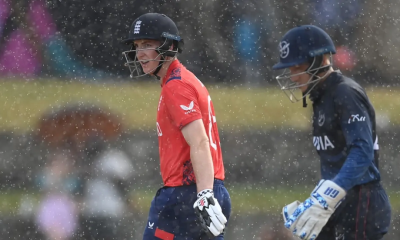Are Scotland about to send them homeward, think again? All will be revealed in the final shake-down of a fascinating Group B, but if England thought their defenestration from last year’s 50-over World Cup was the ultimate humiliation, they might have to ready themselves for even greater discomfort, even closer to home.
That’s the upshot of a rousing Scotland run-chase against Oman in Antigua, which was ignited by a feisty knock of 41 from 20 balls by George Munsey and sealed in a pointed hurry with 41 balls to spare, thanks to Brandon McMullen’s combative 61 from 31, whose roar of triumph echoed around the Sir Vivian Richards Stadium as he dragged the winning boundary through square leg off Bilal Khan.
It was Scotland’s second victory to go alongside the pivotal wash-out against England that set the tone for each team’s campaign, and it has placed their progression firmly in their own hands. Even a narrow loss to Australia could yet be enough, if England are unable to instigate a near four point swing in net run rate in their next two matches against Oman and Namibia.
For Oman, three losses from three ends their own hopes, as well as England’s chance to dictate the terms of their own progression in the manner that you’d expect from defending world champions.In the final analysis, Scotland outmuscled Oman by 11 sixes to four, but it was two in particular – off consecutive balls in the seventh over of their chase – that ended any prospect of this being a tense tiptoe over the finish line. Munsey’s superb command of the reverse-sweep had been telegraphed in the England wash-out, but when he twice launched Aqib Ilyas onto the grass banks at the left-hander’s backward point, Scotland turned on the afterburners.
They hadn’t exactly been sluggish in the powerplay, reaching 50 for 1 in six overs, with Michael Jones’s 16 from 13 containing the first two sixes of their chase, but thereafter Oman had no means to restrict a free-flowing line-up. The final 103 runs of the chase were duly chewed up in just 43 balls, as Scotland’s batters kept raining down the blows, safe in the knowledge that every man in the line-up was primed to do likewise.
Munsey fell one over after his bugle-call blows, though not before slamming another sweep onto the grass in a 16-run over that also contained five leg-side wides – an indication of the extent to which Oman had run out of places to hide. Their cause was not helped by another sloppy catching display from the most fallible team in the tournament, including a bad miss by Rafiullah at deep midwicket off McMullen, but in truth, such was the collective commitment to attack, it probably wouldn’t have made much difference.
This approach was epitomised by Scotland’s captain, Richie Berrington, who belted Aqib for a six and a four, and was then beaten by consecutive googlies in the same over, the second of which bowled him for 13 from 7. But Matt Cross joined an increasingly free-flowing McMullen to romp towards the line with consecutive sixes of his own, deposited over square leg as Ayaan Khan’s only over was launched for 20.On a fresh pitch, on a fresh island, it was something of a surprise that Oman chose to bat first after winning the toss – Berrington was perfectly happy with the chance to take stock and then chase – but thanks to a diligent 54 from 40 balls from Patrik Athavale at the top of the order, and some late impetus from Ayaan (41 not out from 39), they were nonetheless able to post what might have been a competitive 150 for 7, their highest total in three attempts at the tournament.
Athavale made a first-ball duck in his last outing against Australia, but was this time the mainstay of an innings that never quite hit its groove but kept progressing thanks to an energetic attitude that prevented Scotland from dictating the terms of engagement, and arguably induced a handful of lackadaisical moments – most notably Munsey’s spill over the ropes at long-on that allowed Athavale to reach his fifty from 38 balls.
But then came a very revealing shot in anger, a huge leading-edge from Naseem Khushi that hung in the breeze, kept three fielders in the hunt, yet sailed clean over the long boundary at extra cover. It was an indication of the riches on offer if teams hit with the wind and committed to their stroke. For some reason, Khushi decided to go in the diametrically opposite direction two balls later, and Mark Watt at short backward square snaffled a miscued ramp. But the lesson, it transpired, would not be lost on his opponents.
Watt, arguably Scotland’s key bowling weapon, had not been at his most incisive, or economical, in the Namibia victory, but this time he was right back into the thick of the action – for all manner of different reasons.
After being thrown the ball at the top of the powerplay, Watt burgled his way through a three-run opening over that included, from his third ball, one of his trademark 24-yard long-balls, bowled from behind the umpire to confound the batter’s sense of length. But, after inducing an edge from Zeeshan Maqsood at the end of his second over, that delivery became the cause of a minor rumpus when the new man, Khalid Kail, strayed into his sights.
Clearly prepared for the tactic, Kail pulled out of his stance on the first occasion, then did so again – apparently after Watt had informed the umpire he would be producing it again. This time the ball hit the stumps, but was again signalled dead, an upshot that annoyed the Scots, seeing as Kail had clearly been ready to receive. Before it could become a genuine incident, however, Kail pushed his next ball into the covers, was sent back looking for a second run, and Watt whipped off the bails with an additional sense of vindication.
The rest of the wickets were shared among a diligent Scotland attack, including two for the returning Safyaan Sharif, who replaced the injured Brad Currie for what was his 200th appearance across formats for his country. If all goes well against Australia next week, he might yet have a chance to add a few more caps to that tally before Scotland’s Caribbean jaunt is done.
Brief scores:
Scotland 153 for 3 in 13.1 overs (Brandon McMullen 61*, George Munsey 41; Bilal Khan 1-12, Aqib Ilyas 1-41, Mehran Khan 1-16 ) beat Oman 150 for 7 in 20 overs (Pratik Athavale 54, Ayaan Khan 41*; Mark Watt 1-25, Brad Wheal 1-19, Chris Sole 1-41, Safyaan Sarif 2-40, Chris Greaves 1-02) by seven wickets
[Cricinfo]


















































